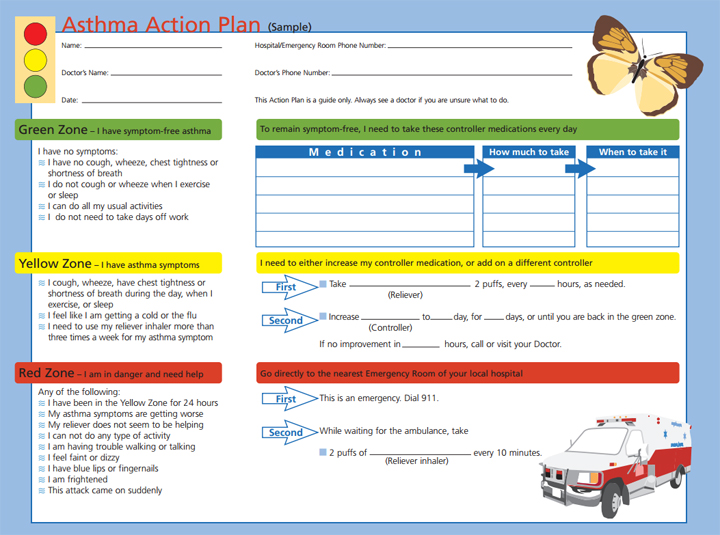Watch above: An action plan for asthma patients to better manage their disease. Crystal Goomansingh reports.

TORONTO – Asthma action plans are meant to allow patients take control of their own health care.
But only 17 per cent of asthmatic patients have talked to their doctor about an action plan, according to the Asthma Society of Canada.
“So you take an asthma action plan it empowers the patient. It helps them be better self managers,” Carole Madeley, registered respiratory therapist, Ontario Lung Association.
“And it’s also been shown to reduce the amount of time that they have to keep running to their family physician or healthcare provider because their symptoms have increased with their asthma.”
An action plan is a simple way for asthmatic patients to figure out for themselves whether their symptoms require immediate help or not.
The action plan is set up like a traffic light: a red light means the patient needs help, a yellow means they are experiencing some symptoms and a green light means they are symptom-free.
Each light has a corresponding check list that will help determine what they need to do to either stay symptom-free or get help.
“Any disease that tends to vary a lot day to day Is well-suited to self-management. And asthma is a good example of that because people with asthma tend to have flares with things like colds or even for example, change of season,” Global News medical contributor Dr. Samir Gupta said. “Having an asthma plan will improve outcomes.”
Approximately 1.9 million people in Ontario and one in five children in Canada have asthma, Madeley said.
And according to the Asthma Society of Canada, many of them underestimate how bad their condition can be. A 2005 poll conducted for the organization found 28 per cent of people have at least one symptom present every day and 29 per cent are frequently woken up at night because of their asthma.
And 10 per cent of people surveyed in the poll went to the emergency room in the previous year. Twelve per cent of respondents reported having to miss work or school because of their symptoms.
Watch: Dr. Samir Gupta talks about why more asthma patients should have an action plan.
So why don’t more people have an action plan? Gupta explains it comes down to a lack of training and not enough time among primary care physicians.
“Firstly, they don’t have the training on how to produce action plans and secondly they just don’t have the time to produce one for each and every patient,” Gupta said.
So Gupta’s research team has leveraged technology to help more people self-manage their asthma. Their team designed a system called the Electronic Asthma Management System that starts with a tablet-based questionnaire that can be filled out by the patient while they wait to see their doctor.
The software then analyzes answers to the questionnaire and provides the doctor with the patient’s answers, makes medication recommendations, and automatically produces a personalized, printable action plan for the patient.
But asthma patients are not the only ones who can benefit from an action plan, Gupta said.
He said people with chronic obstructive pulmonary disease (COPD), arthritis, heart failure, hypertension and diabetes have also been shown to have better outcomes by using self-management.
– With files from Crystal Goomansingh
- Bird flu risk to humans an ‘enormous concern,’ WHO says. Here’s what to know
- ‘She gets to be 10’: Ontario child’s heart donated to girl the same age
- Shoppers faces proposed class action over claims company is ‘abusive’ to pharmacists
- Most Canadian youth visit dentists, but lack of insurance a barrier




Comments